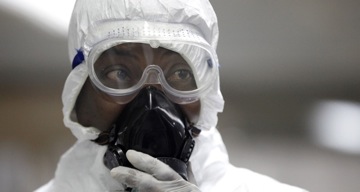We have praised Cuba on these pages for sending 461 doctors to West Africa to help combat the Ebola outbreak. In a country with a population of just over 10 million, proportionately, this would be like the United States sending about 15,360 doctors to West Africa.
Today, we commend Nigeria for its successful effort to contain Ebola. The West African nation dispelled the notion, in some quarters, that nothing works in Africa.
The World Health Organization’s (WHO) country representative Rui Gama Vaz reports that there has been no new outbreak for at least 42 days and that for now Nigeria is “Ebola free.” We hope the West African giant remains that way. It would be a nightmare trying to deal with the consequences of a raging outbreak similar to what we are witnessing in Liberia, in Sierra Leone and in Guinea.
Nigerian healthcare authorities could offer some advice based on their experience to the incompetent management at Texas Health Presbyterian Hospital Dallas where Thomas Eric Duncan, the ailing Liberian national was sent home on September 25 even after his temperature measured 103 degrees and told to take Tylenol. By the time he was admitted to the hospital on September 28, the disease had taken its toll.
The hospital, according to a Duncan family member, refused to transport him to a specialized hospital such as Emory University Medical Center where several patients had already been successfully treated. Texas Health’s conduct was what is typically associated with a so-called “Third World” country’s behavior.
Even more tragic, somehow, two nurses who were involved in treating Duncan, have now been infected with Ebola. Before it was confirmed that she was infected, one of the nurses was cleared for travel by the Centers for Disease Control and Prevention (CDC) from Dallas to Cleveland. Now there is concern that people she may have been in contact with were also exposed to the disease and more people are either being monitored or placed under quarantine.
In Nigeria the authorities quickly tracked down everyone, 894 people, who may have been in contact with the original patient, a Liberian American named Patrick Sawyer who became ill while on a plane traveling to Nigeria, and placed all of them under strict monitoring. The medical authorities also quickly created Ebola isolation wards in a number of hospitals.
There were a total of 19 cases in Nigeria and seven people died which translates into a 37% mortality rate. Four of those who died were healthcare workers who treated Sawyer before it was known he had Ebola. The WHO has previously reported mortality rates ranging from 64% in Guinea and 39% in Sierra Leone.
In Nigeria the outcome was positive. The authorities were so thorough that 18,500 people were reportedly interviewed to determine if they could have been exposed.
“The last chain of transmission has been broken. The disease is gone,” WHO’s Dr. Vaz said on Monday. “This is a spectacular story, that Ebola can be defeated.”
Nigeria showed the world that when strict protocols are observed and with dedication and commonsense — with all the news coverage about Ebola why did Texas Health allow Duncan to go home when he first reported to the hospital with a fever of 103? — that Ebola can be contained.
The international community would be wise to consult with healthcare and medical authorities in Nigeria.







